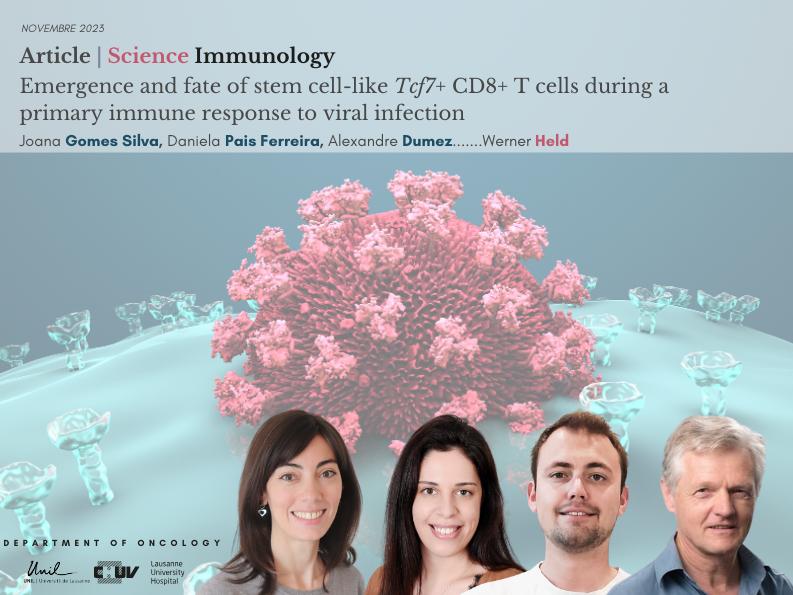
Biologie
Recherche
Emergence of stem-like and killer T cells in response to viral infection
The paper addresses the long-standing question of how rare naïve T cells yield a large pool of short-lived killer T cells and a minor population of long-lived stem cell-like memory T cells. The initial encounter of naïve T cells with antigen is shown to yield stem-like T cells, which by default become memory cells, but can deviate towards killer cells in response to inflammation.

The research*, published in Science Immunology, was conducted by Joana Silva, Daniela Pais, Alexandre Dumez and colleagues and was directed by Pr Werner Held, from the Departement of oncology UNIL-CHUV.
Viral infection produces a large pool of killer CD8+ T cells that eliminate infected host cells but have a limited lifespan. Simultaneously, a minor population of long-lived, stem cell-like memory cells forms, providing immune protection against reinfection by the same pathogen. The unresolved question has been whether these stem-like cells derive from the de-differentiation of killer cells or if they are generated directly upon the initial encounter of viral infection and are then present throughout the immune response.
This study unveiled that cells exhibiting stem-like properties, characterized by the expression of TCF1 (Tcf7), are present throughout the immune response to infection. Indeed, infection induces multiple divisions of virus-specific CD8+ T cells while maintaining TCF1 expression and stemness, ultimately producing TCF1+ memory cells post-pathogen clearance. However, exposure of these early-divided TCF1+ cells to inflammatory signals suppresses TCF1 expression, which results in the irreversible loss of stem cell-like properties and initiating the differentiation towards killer cells. Consequently, inflammation plays a pivotal role in steering stem-like cells that are memory prone towards differentiation into killer cells.
In conclusion, this study successfully identifies the elusive "central memory precursor" CD8+ T cell in response to infection, which is important in order to improve the generation of CD8+ T cell memory based on vaccination.
The research was supported by the Swiss National Science Foundation and the Swiss Cancer Research Foundation.
*Emergence and fate of stem cell-like Tcf7+ CD8+ T cells during a primary immune response to viral infection


